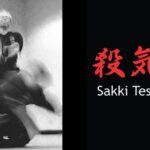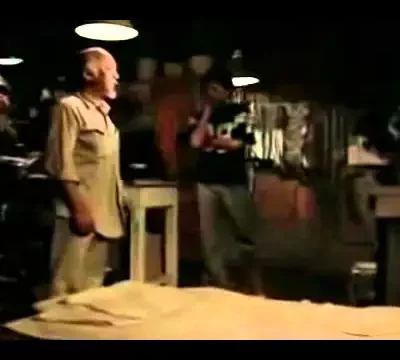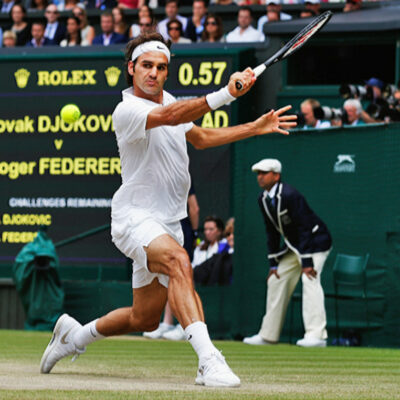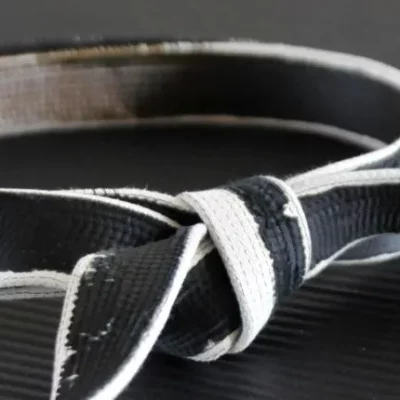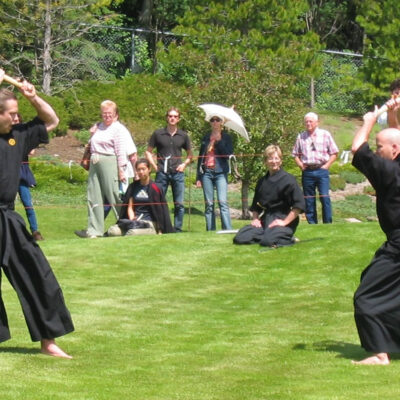I can speak from personal experience how Martial Arts can be a powerful tool in the fight against anxiety and depression. Before I began training in Martial Arts, I was struggling with anxiety induced depression. A combination of huge stress, existential crisis and feeling of inadequacy was leading to unhealthy places mentally and physically. It wasn’t until I started training in Martial Arts that I started to see light at the end of the tunnel.
Everyone’s struggle with anxiety and depression is unique. It’s taken me a combination of martial arts training, therapy and some medication over the years to get to a healthy place.
Here I’ll outline how training in Ninjutsu has helped me with my struggle, and how it can help you too.
And along the way, I’ll include some common Japanese sayings.
The most obvious and direct way martial arts can help is with exercise.
One of my goals was to lose weight when I first started training. But I was surprised at how much of an impact it had on my emotional and mental health.
We think of the mind and the body as two separate systems. But in reality your mental health is heavily affected by your physical health, and vice versa.
Cortisol and adrenaline are stress hormones that trigger the “freeze, fight, or flight” response. Anxiety is triggered by these stress hormones. Exercise has been shown to reliably reduce these hormones in your system.
Endorphins are a feel good hormone that acts as the body’s natural pain reliever and mood booster. These hormones are triggered by exercise. This creates a one-two punch against anxiety and depression.
So the more you exercise, the more you boost the feel good hormones and reduce the feel bad hormones in your brain. And martial arts training is a great way to exercise the whole body, maximizing the benefits.
I always felt my best at the end of a Ninjutsu class. Yes, I was tired from the workout but felt recharged and ready to tackle the world.
When you’re stuck in your head all the time, it can be difficult to discipline yourself to build healthy habits. That’s why a little external pressure can be a great motivator.
I’ve always been notorious for my lack of punctuality in self driven tasks and appointments. And I’ve noticed that I always seem to do better when I commit to an activity that involves other people or had a hard “start-time” (like a class).
Committing to showing up for a class can be just the nudge needed to build a healthy habit. The external pressure of showing up when you said you’d be there, or paid for a class, can be just enough to get things going.
The more I went to class, the more punctual I became. Turns out that the only thing that could get me out of my head was an external motivator – like not disrupting the class by being late. I wasn’t afraid of being reprimanded so much as being a distraction for class.
It can be hard to maintain momentum when you start seeing progress. Most people don’t realize how challenging daily activities can be when you’re struggling with anxiety and depression. Small tasks feel monumental.
Whenever I would be faced with a task or project, my brain would try to plan everything out and view the entire thing complete. That makes everything look a hundred times bigger and more difficult. I didn’t realize how much I was derailing myself until I had spent time training.
A great way for building momentum is setting incremental goals. And martial arts is great for that.
The focus of every class is to get just a little bit better than yesterday. And training involves milestones, such rank or belt levels. Each time you reach a new milestone you’ll increase your momentum (and of course have something to celebrate).
Rather than try to be the world’s best Ninjutsu practitioner, I just tried to get a little bit better each day. Not great. Just better than yesterday. And my growth accelerated. It was yet another benefit that I stumbled into during class.
When your mind is always on overdrive, it’s hard to not get distracted. Pretty soon you find yourself obsessing over little things that don’t generate a positive impact.
In our always connected world, it’s hard to disconnect from the distractions. Every time we hear that buzz of a notification, we get a little hit of dopamine in our brain. Dopamine is that hormone that makes us satisfied – albeit only momentarily.
This makes us become addicted to the distraction itself. And in doing so makes it even harder to focus on any task that isn’t immediately satisfying.
In the dojo, things are different since it feels like its own little world. During class you are entirely in the moment, free of distractions outside of the classroom itself.
This little detox each class helps you develop better focus outside the class because you’ve given your brain a break from the stressors and distractions. It’s these little breaks that helps your mind refocus on what matters.
Let’s face it; our outcomes are directly influenced by our outlook. And one of the greatest long term benefits of training in this art is having a positive outlook and attitude – even when times are tough.
I would beat myself up when I would struggle with something. I felt that the difficult situation was a negative reflection on me. The struggle was a sign of weakness in me.
Thankfully, Ninjutsu translates as “the art of perseverance”, and that is the greatest gift it has given me – the ability to persevere.
But it was something that one of my Japanese teachers said that really stuck in my head and made all the difference: “the struggle is what makes us strong.”
These words of wisdom have made all the difference. Instead of looking at my struggles with anxiety and depression as a sign of weakness in me, I could look at them as a sign of strength. Now every difficult situation is simply an opportunity to become stronger. I don’t have to run from the struggle anymore – instead I lean into it and continue to persevere.
If you’re struggling with anxiety or depression, first realize that you’re not alone. You’re in good company, as it’s common for even the most successful people.
It’s also okay to struggle. The struggle is what makes you strong.
Most importantly it’s okay to ask for help. It’s a sign of strength – not weakness.
Talk to your support group (friends/family) about your struggle. See about therapy. Consider talking to your doctor to prescribe something that might help alleviate the symptoms to start.
It’s all about building momentum, as well as accepting that you’ll stumble along the way.
Get new content straight to your inbox, gain deeper insights into Japanese Martial Arts, and get exclusive offers by joining the Todai Clan!


